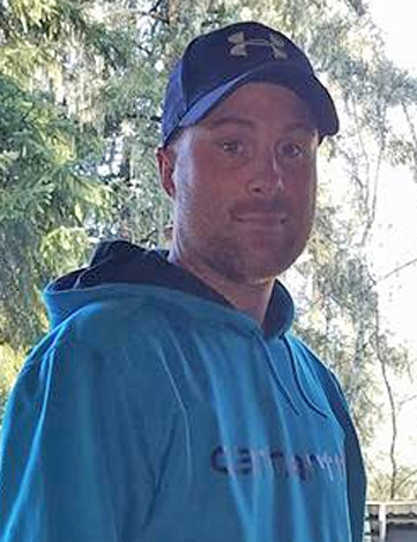Juneau’s first police shooting in nine years came at the hands of one of the department’s most experienced officers.
JPD on Monday announced that on Saturday morning, Sgt. Chris Gifford fired a single shot, injuring 38-year-old Jeremie Shaun Tinney. Gifford was accompanied by officer Darin Schultz, who did not fire his weapon.
According to a department statement, Gifford has been part of JPD for more than 16 years and has more than 18 years of police experience. Schultz has worked for JPD for more than 19 years.
Tinney was in serious but stable condition Saturday afternoon, and on Sunday, he was released from Harborview Medical Center in Seattle, the hospital confirmed. Tinney was transferred there from Bartlett Regional Hospital.
Members of Tinney’s family said he is recovering and is being helped by his mother.
Neither Tinney nor the officer who shot him has been charged with a crime.
“It’s still developing,” Lt. David Campbell, a spokesperson for the Juneau Police Department, said about the investigation.
If charges against Tinney are warranted, they would be forwarded to the district attorney’s office. If the charges warrant a felony, a grand jury would be empaneled.
If charges against Gifford are warranted, they likely would come from the Alaska Department of Law.
The state’s Office of Special Prosecutions reviews every police-involved shooting in Alaska, said its director, Robert Henderson.
“All of those matters statewide come to my office,” he said.
In this case, the Juneau Police Department requested the Alaska Bureau of Investigation (a branch of the Alaska State Troopers) perform an independent investigation to ensure Henderson’s office gets impartial information.
Gifford and Schultz remain on administrative leave from the department, and their return to duty will be at the discretion of Juneau Police Chief Bryce Johnson.
Tinney’s path forward will run through the criminal justice system regardless of any decision here. After his release from Harborview, Tinney was taken into custody by Washington state officials for an outstanding bench warrant.
In 1997, Tinney was arrested and convicted in Washington state for beating his 2-year-old son with a metal back scratcher and biting him repeatedly. Tinney also was charged with beating his then-wife and of threatening to kill the deputies who arrested him, but those charges were dropped as part of a plea deal.
After pleading guilty to a felony count of child abuse, Tinney was ordered to stay away from his son. According to Washington state court records, he moved to Ketchikan and continued living with the boy.
A warrant was issued for his arrest, and even though he had numerous run-ins with Alaska law enforcement, the Washington warrant didn’t allow his extradition.
In 2005, he was taken into custody in Washington, then released after 39 days in jail.
When he again failed to follow his conditions of release, another warrant was issued for his arrest.
It was on that warrant that Washington police took him into custody this week, and if the recommendations of the warrant are followed, he will spend 25 days in jail.
The circumstances leading to the shooting remain unclear.
What we do know is that the shooting took place after Gifford and Schultz responded to a car accident in the Lena Point neighborhood. When officers arrived, they found a gray Jeep Cherokee in a ditch. At the scene were Tinney and a second man, a 42-year-old Juneau resident whom police have not identified.
“At this point, he’s strictly a witness,” Campbell said, which is why he is not being identified.
About “one minute” after the officers contacted Tinney, the shot was fired.
Police have said Tinney barricaded himself in the vehicle, but that has not been independently confirmed, and JPD has said no weapons were found in the car.
Alaska law allows an officer to use “deadly force” under three circumstances: If a suspect has attempted a felony involving the use of force; if a person is attempting to escape while carrying a firearm; or if a person could “endanger life or inflict serious physical injury” if not immediately stopped.
Tinney did not respond to calls and messages left on his cellphone Monday. It could not be confirmed whether he is still in custody in Washington.
According to court records, Tinney threatened to commit suicide in a video posted to Facebook in late November.
“Jeremie was saying goodbyes to his mother with (a) rifle pointed in his mouth,” according to testimony provided in support of a protective order against Tinney.
Tinney also had a case of beer and in a second message said he would “eat the bullet.”
Following that testimony, the judge approved a temporary protective order. A hearing on a long-term order is scheduled for Dec. 9.
Tinney has an extensive criminal history that includes multiple physical confrontations with police, multiple domestic violence incidents and multiple bar fights. Not all are listed here.
In 2009, he was charged with misdemeanor charges of domestic violence assault and resisting a police officer. He pleaded guilty to both charges.
In 2011, according to court records, police were forced to restrain him after he began bashing his head against the roof and sides of a squad car that was transporting him.
In another incident the same year, Tinney “did challenge officer (Shawn) Phelps to a fight, shouting in essence: ‘When you get me out of this car, it’s on! We are going to go.’”
He subsequently pleaded guilty to a misdemeanor charge of disorderly conduct with a challenge to fight. Charges of interfering with an officer and misdemeanor assault were dropped by prosecutors.
A review of records on file with the Juneau courthouse did not reveal the involvement of Gifford or Schultz in any of Tinney’s cases, but Campbell said Gifford was definitely aware of Tinney’s history and identified him as soon as he saw him.

